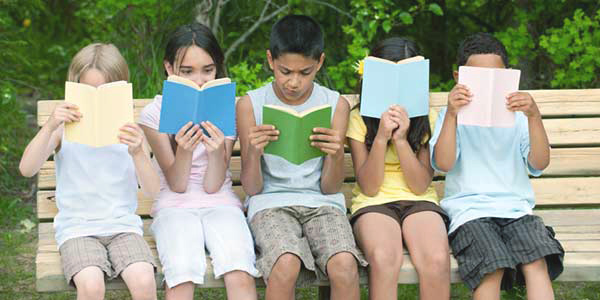
If it’s very much the latter, it’s worth bearing in mind that reading for pleasure is considered more important to a child’s educational outcomes than things like wealth or social class. The Institute of Education found that “children who read for pleasure made more progress in maths, vocabulary and spelling between the ages of 10 and 16 than those who rarely read”.
Even more surprisingly, researchers found that the combined effect of reading books often, going to the library regularly and reading newspapers at 16 was four times greater than the advantage children gained from having a parent with a degree.
So what can you do to help ramp up the fun factor in your literacy strategy? Here are three top tips:
-
Start a shared reading scheme
Shared reading between older and younger pupils can improve the confidence and reading skills of both. The National Literacy Trust has some great ideas, as well as a paired reading toolkit.
Not sure how it would work in your school? Take a tip from Leighton Primary School in Crewe who set up a ‘Cool Dudes’ reading buddies project, where Years 5 and 6 teamed with Years 3 and 4.
“Our Reading Champions group meets every Monday after school for 45 minutes. Over the first term of the year, the group of Year 5 and 6 boys are trained to work with younger pupils. In the following two terms, the Year 3 and 4 boys, or the Cool Dudes as they’re known, join the group. During the sessions, each Cool Dude is paired with a Reading Champion, buddy reading takes place and the boys work on a reading project together.”
-
Set up a film to book club
Not all kids get on with fiction - but many love watching films. A great way to encourage reluctant readers is to set up a book group with a difference. Make it a film to book club, where children can watch a film or even a TV programme, so they’re engaged with the story (and know what’s going on) before reading the book.
-
Let children see you reading
Seeing staff reading can be a great motivator for children. Adopt a “caught reading” campaign, where staff are photographed “caught in the act” of reading and the photos go up on posters around the school. The posters could say what you’re currently reading - and it doesn’t matter if that’s just a magazine or emails.
Or try a “drop everything and read” campaign which is timetabled into the school day. This can be just 15 minutes when everyone (staff included) have to stop what they’re doing to read their favourite books.









